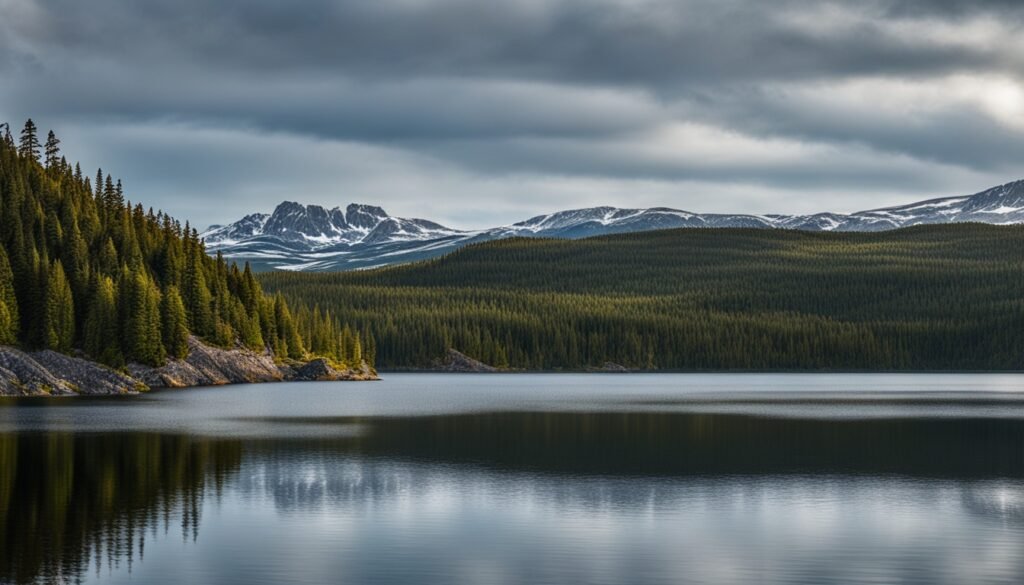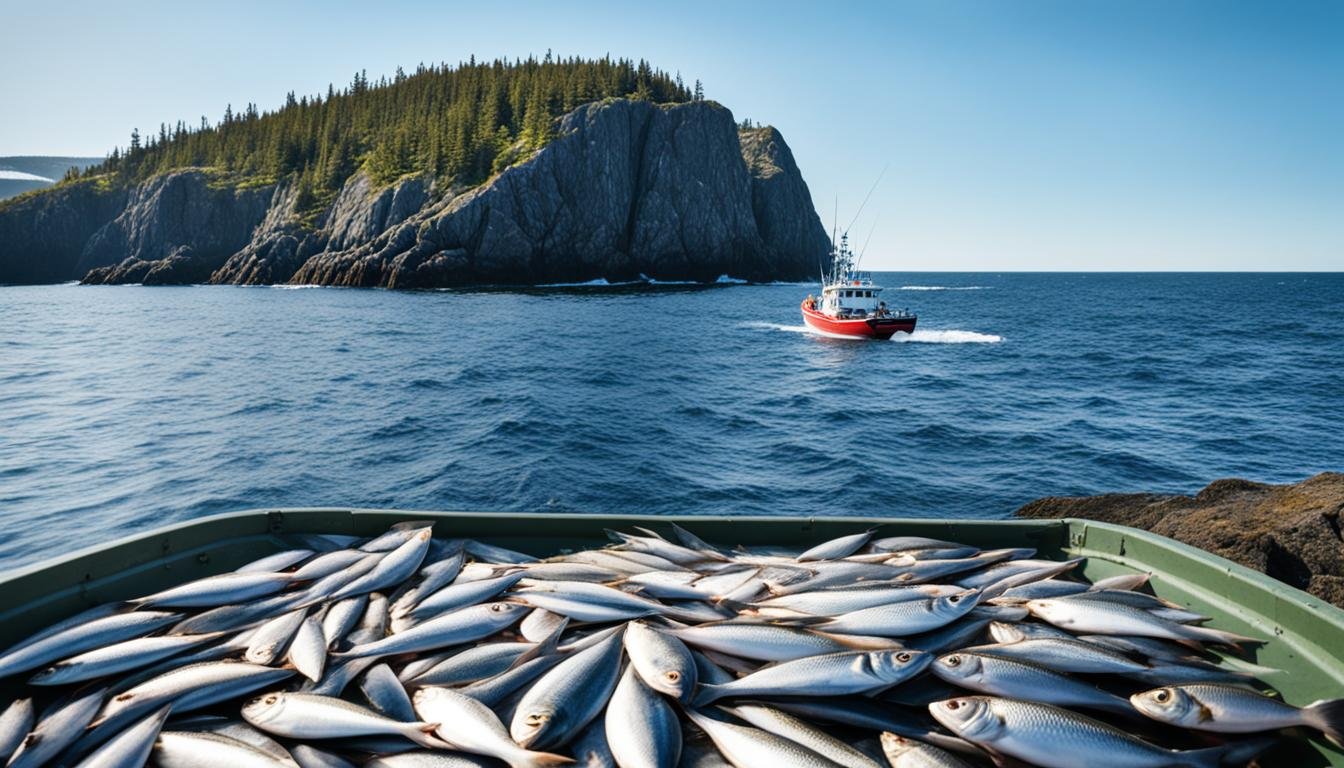Newfoundland and Labrador offers diverse and well-regulated fisheries. The province has over 200 Salmon Fishing Areas (SFAs). These are outlined in the Newfoundland and Labrador Fishing Regulations Guide.
Fisheries and Oceans Canada (DFO) publishes this essential guide. It covers regulations, licenses, catch limits, and conservation efforts. The guide includes info on salmon, trout, smelt, Arctic char, northern pike, and whitefish.
Following these guidelines helps protect marine ecosystems. It also supports coastal communities in the province.
Key Takeaways about Newfoundland and Labrador Fishing Regulations
- The Newfoundland and Labrador Fishing Regulations Guide provides comprehensive information on fishing regulations, licenses, and catch limits for a variety of species.
- The guide promotes sustainable fishing practices to protect the province’s marine ecosystems and coastal communities.
- Anglers can find details on Salmon Fishing Areas (SFAs), Trout Angling Zones, season dates, and gear requirements.
- The guide covers licensing and fees for both recreational and commercial fishing, including species such as smelt, Arctic char, northern pike, and whitefish.
- Anglers can access information on DFO enforcement efforts and guidelines for protecting fish and fish habitat.
Introduction to Newfoundland and Labrador Fishing Regulations
Fishing is crucial to Newfoundland and Labrador’s economy. It supports both recreational and commercial activities. The province has strict rules to protect this valuable resource.
Overview of Fishing Regulations
Fishing rules in Newfoundland and Labrador are comprehensive. They cover licenses, catch limits, gear restrictions, and seasonal closures. These rules aim to protect fish stocks and promote responsible fishing.
Anglers need proper licenses and must follow catch limits. This applies to salmon, trout, smelt, Arctic char, and other species. Commercial fishers have strict quotas and gear regulations for their target species.
Importance of Sustainable Fishing Practices
Sustainable fishing is vital for Newfoundland and Labrador’s economy and marine ecosystems. Overfishing can be devastating, as seen in the 1990s cod fishery collapse.
Fishing rules stress sustainable practices for all. This includes respecting catch limits and using proper gear. It also involves protecting vulnerable fish species and their habitats.
“Sustainable fishing practices are essential for the long-term viability of Newfoundland and Labrador’s fisheries, both for recreational anglers and commercial operators. By working together to protect our marine resources, we can ensure that future generations can continue to enjoy the bounty of our waters.”
Salmon Fishing in Newfoundland and Labrador
Newfoundland and Labrador boasts exceptional salmon fishing. Over 60% of North America’s best wild Atlantic salmon rivers are here. Anglers can fish in nearly 200 wild Atlantic salmon rivers across the region.
Salmon Fishing Areas (SFAs)
The province has several Salmon Fishing Areas (SFAs). Each SFA has its own rules and features. Anglers must know the specific SFA they plan to fish in.
Salmon Season Dates and Retention Limits
Salmon angling usually runs from June to September. Fall angling (catch and release only) is available until October on three major rivers. These are the Gander, Exploits, and Humber.
Anglers should know the retention limits. These specify how many salmon can be kept per day or in possession.
Tag Use and Catch and Release Guidelines
Salmon fishing here requires tags. Anglers must follow catch and release guidelines to protect fish populations. Proper handling and release techniques are vital for salmon survival.
| Salmon Fishing Statistic | Value |
|---|---|
| Percentage of North America’s best wild Atlantic Salmon rivers in Newfoundland and Labrador | Over 60% |
| Number of wild Atlantic salmon rivers in Newfoundland and Labrador | Nearly 200 |
| Salmon angling season | June to September, with catch and release up to October on three major rivers |
| Requirement for non-residents to hire a guide or outfitter | Yes, to fish inland waters |
| Special licences required for National Parks | Yes, for Gros Morne, Terra Nova, and Torngat Mountains National Parks |
Salmon fishing in Newfoundland and Labrador is a beloved outdoor activity. Anglers must know the province’s rules and conservation practices. Understanding SFAs, seasons, and limits ensures a safe, fun fishing trip.
By following these guidelines, anglers help manage the province’s salmon populations sustainably. This ensures great fishing for years to come.
Trout Angling Zones and Regulations
Newfoundland and Labrador offers diverse trout angling opportunities across various zones. The province’s fishing rules protect trout populations. Anglers can enjoy the sport while preserving natural resources.
Trout Angling Zones
Newfoundland and Labrador has several trout angling zones with unique regulations. Anglers must know the rules for their chosen fishing area. This approach allows for targeted management efforts in each region.
Trout Season Dates and Bag/Possession Limits
- The trout fishing season usually runs from April to September. Start and end dates vary by zone.
- Daily bag limits range from 3 to 8 fish, depending on the zone.
- Possession limits restrict the total number of trout an angler can have. These typically range from 6 to 16 fish.
- Anglers should practice catch-and-release, especially for trophy-sized trout. This helps conserve these prized game fish.
Following zone rules and limits helps anglers enjoy trout fishing responsibly. It also supports the sustainability of Newfoundland and Labrador’s trout populations.
| Zone | Trout Season Dates | Daily Bag Limit | Possession Limit |
|---|---|---|---|
| Zone 1 | April 15 – September 30 | 5 | 10 |
| Zone 2 | May 1 – September 30 | 8 | 16 |
| Zone 3 | April 15 – September 15 | 3 | 6 |
“The abundance of rivers and streams in Newfoundland and Labrador provides ample opportunities for anglers to experience exciting fly fishing encounters.”
Newfoundland and Labrador Fishing Regulations for Other Species

Newfoundland and Labrador boast diverse aquatic ecosystems with many fish species. The province’s fishing rules cover smelt, Arctic char, northern pike, and whitefish. These regulations ensure sustainable fisheries and healthy aquatic environments.
Fishing Seasons and Limits for Smelt, Arctic Char, Northern Pike, and Whitefish
Fishing seasons and limits vary across Newfoundland and Labrador. Anglers must know the rules for their fishing spots to stay compliant.
- Smelt: The season runs from March 1 to May 31. Daily bag limit: 300 smelt. Possession limit: 600 smelt.
- Arctic Char: Season varies by location, generally June 1 to September 30. Daily bag limit: 5 Arctic char. Possession limit: 10 Arctic char.
- Northern Pike: Can be fished year-round in most areas. Daily bag limit: 3 northern pike. Possession limit: 6 northern pike.
- Whitefish: Season typically runs from June 1 to September 30. Daily bag limit: 10 whitefish. Possession limit: 20 whitefish.
These rules may change. Always check the latest updates from the Newfoundland and Labrador Department of Fisheries and Oceans before fishing.
Following these rules helps protect Newfoundland and Labrador’s aquatic species. By respecting seasons and limits, anglers help preserve these resources for future generations.
Licensing and Gear Requirements
Newfoundland and Labrador anglers must follow specific licensing and gear rules. These rules help protect fish populations and promote responsible angling practices.
Licence Fees for Salmon, Trout, and Other Species
Commercial salmon fishing licenses in Northern Labrador’s coastal waters cost five dollars. This fee also applies to char and trout fishing licenses.
Gill net fishing for char or trout requires a commercial or food fishing license. Without these, fishing in Northern Labrador’s coastal waters is not allowed.
Gear Type Regulations for Angling
Gill nets for char or trout fishing have specific length limits. In one berth, the maximum is 92 meters. For food fishing, it’s 46 meters.
In other cases, the limit is 366 meters. Gill net fishing for char or trout is banned from October 1 to June 30.
Southern Labrador residents have special fishing allowances. These differ from rules in other areas. However, exact details aren’t provided.
| License Type | Fee | Gear Restrictions | Seasonal Restrictions |
|---|---|---|---|
| Commercial Salmon Fishing | $5 | Gill nets up to 92 meters | Prohibited from October 1 to June 30 without a commercial or food fishing license |
| Commercial Char Fishing | $5 | Gill nets up to 92 meters | Prohibited from October 1 to June 30 without a commercial or food fishing license |
| Trout Fishing | $5 | Gill nets up to 46 meters for food fishing, or 366 meters in any other case | Prohibited from October 1 to June 30 without a commercial or food fishing license |
The guide covers more than just licensing fees and gear rules. It explains roles of different entities and application processes. It also details minimum production requirements and business plan viability.
Conclusion
The Newfoundland and Labrador Fishing Regulations Guide is a vital resource for anglers. It offers key info on rules, licenses, and catch limits. The guide helps protect marine ecosystems and supports coastal communities.
This guide stresses the need for responsible fishing practices. It aims to preserve angling traditions for future generations. The guide recognizes fishing’s role in the province’s economy and culture.
Anglers can learn about important regulations and conservation efforts. These include season dates, possession limits, and gear rules. Following these guidelines helps protect vulnerable fish species.
By respecting the rules, anglers support sustainable fishing. This balance benefits both recreational and commercial fishing interests. It ensures the long-term health of Newfoundland and Labrador’s diverse fisheries.
For an overview of fishing regulations and licenses in Canada, please check this guide.
FAQ about Newfoundland and Labrador Fishing Regulations
What is the Newfoundland and Labrador Fishing Regulations Guide?
The guide is a resource for anglers in Newfoundland and Labrador. It’s published by Fisheries and Oceans Canada (DFO). The guide covers regulations, licenses, catch limits, and conservation efforts for fishing in the province.
What are the key regulations and guidelines that anglers must follow in Newfoundland and Labrador?
The guide outlines licensing needs, catch limits, and gear rules. It stresses the importance of sustainable fishing. These practices protect marine ecosystems and coastal communities.
What are the regulations for salmon fishing in Newfoundland and Labrador?
The guide details Salmon Fishing Areas (SFAs) and fishing seasons. It explains retention limits, salmon tags, and catch and release practices. These rules support salmon conservation in the province.
What are the regulations for trout angling in Newfoundland and Labrador?
The guide covers trout angling zones and fishing seasons. It lists daily bag and possession limits for anglers. Following these rules helps protect trout populations in the province.
What other species are covered in the Newfoundland and Labrador Fishing Regulations Guide?
The guide includes rules for smelt, Arctic char, northern pike, and whitefish. It outlines fishing seasons and catch limits for each species.
What are the licensing and gear requirements for anglers in Newfoundland and Labrador?
The guide lists license fees for salmon, trout, and other species. It explains gear restrictions and their importance. Getting proper licenses and following gear rules ensures compliance with regulations.
These practices support the long-term health of the province’s fisheries. Anglers play a key role in protecting Newfoundland and Labrador’s aquatic resources.
Source Links
- https://www.nfl.dfo-mpo.gc.ca/NL/AG/anglersguide
- https://laws.justice.gc.ca/eng/regulations/SOR-78-443/page-2.html
- http://www.nfl.dfo-mpo.gc.ca/en/anglers-guide-2024-2025-annexes-annex-4-newfoundland-and-labrador-wildlife-regulations-guide
- https://www.dfo-mpo.gc.ca/reports-rapports/regs/licences-permis/nfld-Labrador-tn-labrador-eng.htm
- https://www.heritage.nf.ca/articles/economy/moratorium.php
- https://www.nlfhsa.com/regulations
- https://www.canlii.org/en/ca/laws/regu/sor-78-443/latest/sor-78-443.html


